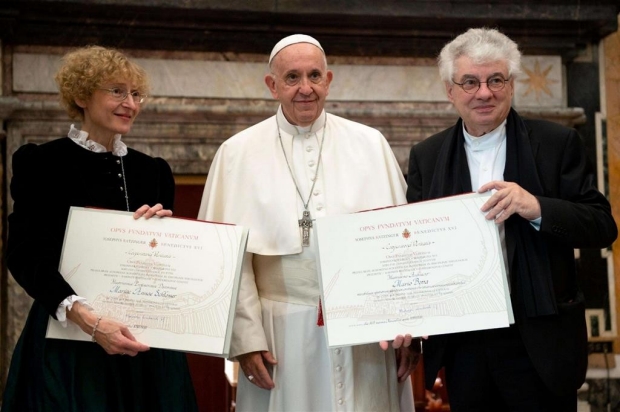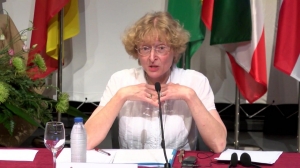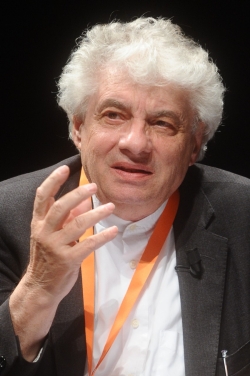Vatican City, 17th November 2018 – “It is a lovely occasion to offer our affectionate and grateful thought to the Pope-Emeritus Benedict XVI”. With these words Pope Francis greeted the people in the Clementine Hall of the Apostolic Palace, in the Vatican City. They were all attending the audience allowed to the Joseph Ratzinger-Benedict XVI Vatican Foundation, in the occasion of the 8th awarding ceremony of Ratzinger Prize. The German theologian Marianne Schlosser and the Swiss architect Mario Botta have received the prestigious Prize this year.
“As admirers of his cultural and spiritual heritage, you have received the mission to cultivate it and continue to make it bear fruit, with that strongly ecclesial spirit that has distinguished Joseph Ratzinger, ever since the days of his richly fertile theological activity in his youth, when he gave precious fruits in the Vatican Council II, and then in an increasingly demanding manner in the successive stages of his long life of service, as a professor, Archbishop, Head of the Dicastery, and finally as Pastor of the Universal Church” Pope Francis affirmed, addressing the members of the Foundation. “With his spirit, he faces the problems of our time with awareness and courage, and knows how to draw – from the attention to the Scriptures in the living tradition of the Church – the wisdom that is necessary for a constructive dialogue with today’s culture. In this way, I encourage you to continue studying his writings, but also to face the new themes on which faith is called to dialogue, like those that have been evoked by you and which I consider very current, such as the care for creation as our common home and the defence of the dignity of the human person”, Pope Francis underlined, while expressing his personal appreciation to the two academics awarded with the Prize.
The Pope said he “was really glad” that the Prize for research and the teaching of theology was given to a woman, Professor Marianne Schlosser. It is not the first time, because Professor Pelletier had already received the Prize in 2014, but “it is very important that the contribution of women to the scientific field of theological research and to the teaching of theology – for so long considered almost exclusive domain of the clergy – becomes more and more recognized. It is necessary that this contribution is encouraged, and that it finds a wider space, together with the growing presence of women in the various fields of responsibility of the Church, in particular, though not only, in the cultural field”.
“In addition to theology – the Pope noticed – since last year the Ratzinger Prizes have been appropriately conferred also in the field of Christian-inspired arts. I therefore congratulate the architect, Mario Botta. Throughout the history of the Church, sacred buildings have been a concrete call to God and to the dimensions of the spirit in which Christian proclamation has spread throughout the world. They expressed the faith of the believing community, they welcomed that community, helping to give form and inspiration to the prayer of that community. The commitment of the architect, creator of a sacred space in the city of men and women is therefore of highest value, and must be recognized and encouraged by the Church, especially when we risk the oblivion of the spiritual dimension and the dehumanization of urban spaces”.
“In the background and in the context of the great problems of our time, theology and art must therefore continue to be animated and elevated by the power of the Spirit, which is the source of strength, joy and hope” the Pope said. He also concluded his speech with the words of Benedict XVI. In fact, in the occasion of his visit to Bagnoregio, home of St. Bonaventure, Benedict XVI had said: «We find a beautiful image of hope in one of his sermons for the Advent, in which he compares the movement of hope with the flight of a bird that spreads its wings to their maximum capacity and draws on all its strength to flap them. In a certain sense, it makes itself movement in order to soar upwards and fly. Hoping is flying, St. Bonaventure says. But hope requires that all our limbs become movement, projected to the true height of our being, towards the promises of God. Whoever hopes, he affirms, “must lift his head, turning his thoughts aloft, to the heights of our existence, namely to God”».
While greeting the Pope, father Federico Lombardi, president of Ratzinger Foundation, underlined that “the cultural and spiritual heritage of Joseph Ratzinger – Benedict XVI is still lively and a lot of people and cultural institutions consider it as a source of inspiration for challenging and new projects of research and dialogue with the culture of our time”. “We also carry on checking and helping to understand how a deep view on the great ideas of the theological considerations made by Joseph Ratzinger and the teachings of Benedict XVI finds them in harmony with the fundamentals of his pontificate. Through our initiatives we can now give a productive contribution to the route of the Church guided by you” Father Lombardi said, referring to the International Symposiums organized every year with the support of Catholic Universities. In particular, the Symposium held in Costa Rica at the end of 2017 regarding the encyclical Laudato sì, has been projected in the future in order to promote our responsibility in the care of the common house. It has also underlined the premises of the teachings of Joseph Ratzinger for the preparation of your great encyclical” he explained. The second Symposium, held on 15th – 16th November at Lumsa University, in Rome, was dedicated to human rights and the context of the debate about the fundamentals of law. “The topic is not only considered crucial by Benedict XVI, but it is also essential in order to recognise human dignity, that you always defend against the risks and the attacks of today’s world”.
Moreover, “Following the example of Joseph Ratzinger and his desire to keep human mind open to the widest horizons” Father Lombardi reminded that the Foundation is planning new international initiatives in order to favour the dialogue among scientific disciplines, philosophy and theology, with the support of several Universities, among which there are Francisco de Vitoria in Madrid, Nicolaus Copernicus in Torun (Poland) and Pázmány Péter in Budapest.
The profiles of Professor Schlosser and architect Botta, who dedicated most of their lives to theology and Christian art, have been outlined by cardinal Angelo Amato, president of the Scientific Committee of the Foundation.
Among the participants there were 15 cardinals (the members of the Scientific Committee of the Foundation Kurt Koch, Luis Francisco Ladaria and Gianfranco Ravasi, the Dean of the College of Cardinals Angelo Sodano, and then Santos Abril, Francis Arinze, Tarcisio Bertone, Salvatore De Giorgi, Walter Kasper, Manuel Monteiro de Castro, Francesco Monterisi, Marc Ouellet, Beniamino Stella, Antonio Maria Vegliò) archbishops and bishops, members of the Diplomatic Corps accredited to the Holy See and a lot of scholars who had received Ratzinger Prize in the previous years.
With the current edition, there will be 18 scholars who have received the Prize since 2011. They come from 12 different countries.
READ THE SPEECH BY POPE FRANCIS



